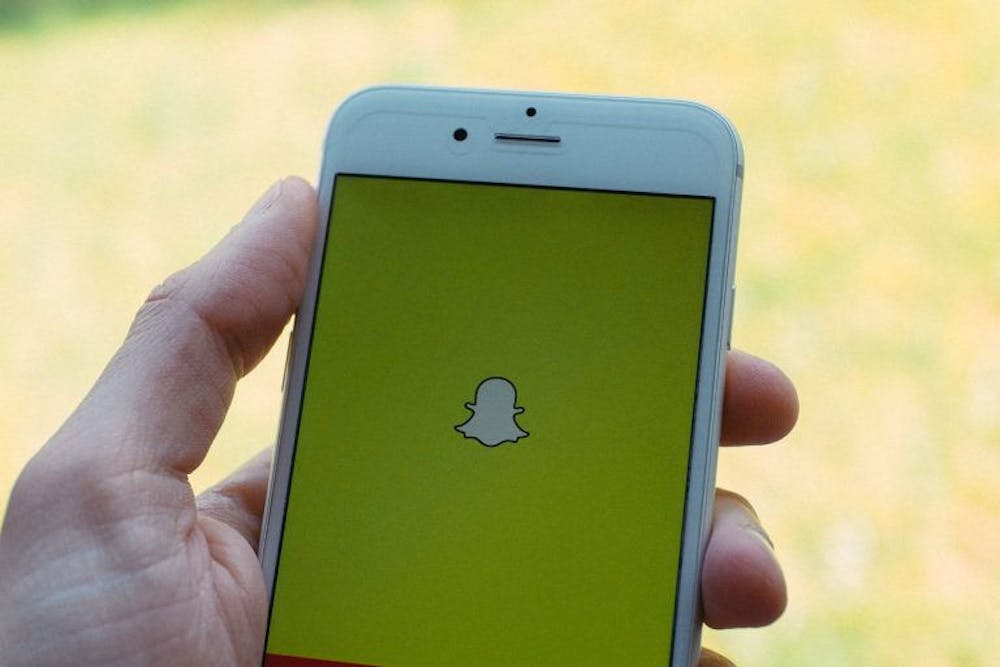Laughter can be heard from all around the table the Mercer University women’s lacrosse team occupies as it has its pregame meal. But freshman Kelly Hagerty could not help but wish she had her phone so she could Snapchat the funny moment.
“Our coaches don’t let us have our phones at the table when we are eating as a team,” Hagerty said. “They want us to talk to each other instead of being on apps like Instagram, Twitter and Snapchat.”
Snapchat was created in 2011 and is an app where people can send each other pictures and videos. After a certain amount of time, the pictures and videos go to an obscure folder on the user’s phone.
One of the newer features is called a Snapchat story, where people can post a Snapchat to all of their friends that stays on their story for an entire 24 hours.
Freshman Kendall Garrett enjoys posting to her Snapchat story often.
“I like Snapchat because it is easy to communicate with friends,” Garrett said. “Especially the story feature, it allows you to always be in the loop of what everyone is doing.”
On the other hand, some people, like freshman Jenny Mazurkiewicz, think that constantly posting pictures and videos to a Snapchat story takes people out of the moment.
“Sometimes it is nice to just enjoy what you are doing and who you are with,” Mazurkiewicz said. “It’s nice to not have to feel like you need to get a video or picture for your Snapchat story just to show other people how much fun you are having.”
Having these Snapchat stories also causes a "fear of missing out," Hagerty said.
“It happens when you are sitting in your bed and look through all of the Snapchat stories you have and see how much fun people are having without you, and it just makes you wish you were there,” Hagerty said.
According to Martin-Wilbourn Partners, a communications firm, Snapchat has now become “the third most popular social app among millennials.” The company said 32.9 percent of millennials have Snapchat, trailing only Instagram -- 43.1 percent -- and Facebook -- 75.5 percent.
Dr. Tanya Sharon, a professor of psychology at Mercer University, said that it may be harder for young people to be their authentic self because of social media and apps like Snapchat.
“On Facebook you don’t get rewarded. You don’t get likes for negative things. You are only allowed to post positive thing. The research supports that,” Sharon said. “So it seems like that would create a strain on people, because you are not validated for being your authentic self.”
Hagerty said she sees where the story feature might be seen as showing off or trying to be something you are not, but she also likes the ease of the app.
“I’ll definitely Snapchat over texting, because then you don’t have to carry out a conversation. You can end it when you want,” Hagerty said.
Hagerty also enjoys the news feature on the app, where different media companies can have their own stories.
“I don’t really read or watch the news, so it is useful for me to just look at the CNN story and see what news stories are trending,” Hagerty said.
Garrett said she likes all of the features of the app, along with being able to keep up with her friends at home.
“Once I got to college, Snapchat became more popular for me and my friends because it was easy for me to see what my friends from home were up to,” Garrett said. “In all, I think the app really helps to keep you up to date with your friends, news and the latest beauty tips. It’s just a great app.”
Snapchat in the picture for most popular app among millennials

According to the communication firm Martin-Wilbourn Partners, Snapchat is the third-most popular app among millennials.



